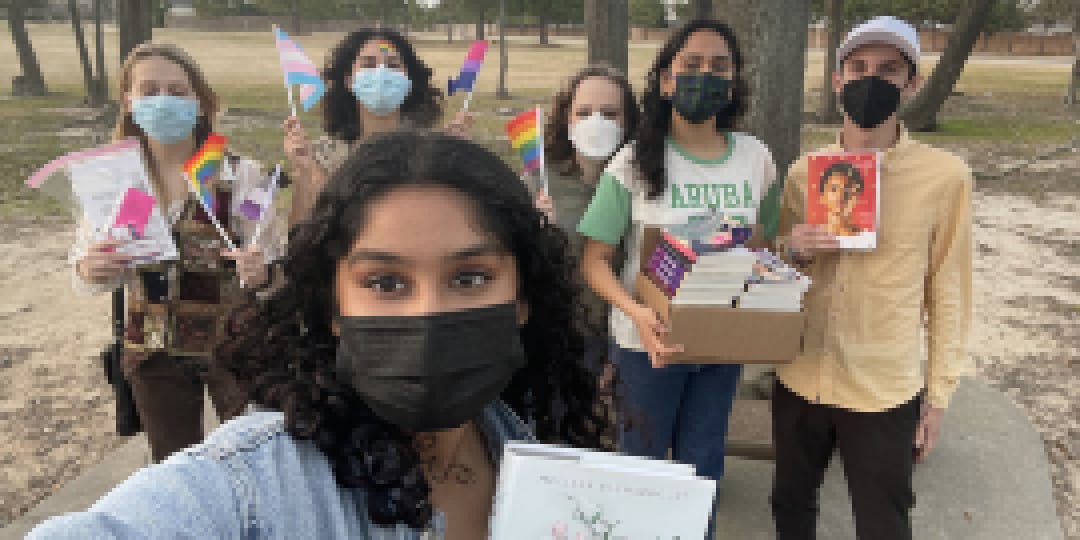
When high school senior Cameron Samuels started attending school board meetings in the Houston suburb of Katy last year, they were typically one of only a few voices—and at times the only voice—speaking in support of student access to LGBTQ materials.
Samuels, 18, who uses they/them pronouns, started by beseeching their district to unblock websites like the Trevor Project, a suicide prevention organization for queer youth, and to refrain from banning library books that featured LGBTQ+ characters or dealt with racism. Around the same time, a Texas lawmaker demanded that schools report their purchases of books that could “make students feel discomfort,” and Samuels says adults showed up in larger numbers than not to support book removals.
“As a member of the LGBTQ community, I feel attacked because that’s something that I am,” Samuels says. “It’s been hard to hear speakers target the LGBTQ community and say we are promoting what they call pornography in these books.”
That changed on Monday, when Samuels says students spoke out against book censorship at a Katy ISD board meeting that was overflowing with supporters. The strong showing came on the heels of what they dubbed “FReadom Week,” during which Samuels and other student members of the nonpartisan group Voters of Tomorrow distributed nearly 200 books featuring LGBTQ+ and BIPOC—Black, Indigenous and people of color—themes at four district high schools.
“We packed the room full,” Samuels says of the board meeting. “There was so much representation from students and supporters of the LGBTQ community, and it was great to see how our FReadom Week had been a success.”

Samuels and their peers are part of a growing movement of students who are pushing back against book bans across the country. As challenges against books about race, gender and sexuality continue to gain traction, New York high school student Jack Lobel says students deserve to learn from literature with perspectives from the LGBTQ+ community and writers of color.
“For book banning in particular, a lot of the coverage has been around lawmakers, authors, parents and school boards, but young people are the one missing out on these important conversations,” says Lobel, 17, who serves as communications director for Voters of Tomorrow. He adds that book distributions are taking place in Texas and Virginia. “Young people are the leaders of tomorrow, and we deserve to have these books be part of our curricula.”
It’s not just Lobel’s group making waves. In the past month, Pennsylvania students have garnered national recognition for successfully fighting back against their school district’s ban on anti-racist books. A group of Texas middle schoolers started the Round Rock Black Students Book Club to dig into literature that represents them. And Missouri students are suing their school district over a banned book list that includes Toni Morrison’s “The Bluest Eye.”

“People will say that [more-inclusive curriculums] will make White people feel uncomfortable,” 17-year-old Christina Ellis, one of the student advocates against Central York School District’s book ban, tells the Washington Post. “Well, it’s also uncomfortable for African American students to hear in classes that their ancestors were being lynched and have all the White kids turn around, look at you and stare at you while the teacher is talking to you about that.”
As for Samuels, they and other Katy ISD students aren’t done yet. They’re planning another book distribution this week—with titles including Toni Morrison’s “Beloved” and Art Spiegelman’s “Maus”—and a rally against book censorship at the Texas Capitol in March.
Samuels says another disturbing aspect of the ongoing controversy is that parents receive a district notification when their child checks out a young adult novel from the library, seemingly targeted at books that feature LGBTQ+ characters and issues.
“[Some students] were like, ‘Never mind, I'm not going to check that book out,” Samuels says of his peers who learned of the notifications. “Those that don't know about it are forcibly outed to their parents without them knowing, and that is a big issue. Students need to have access to this affirming content.”

